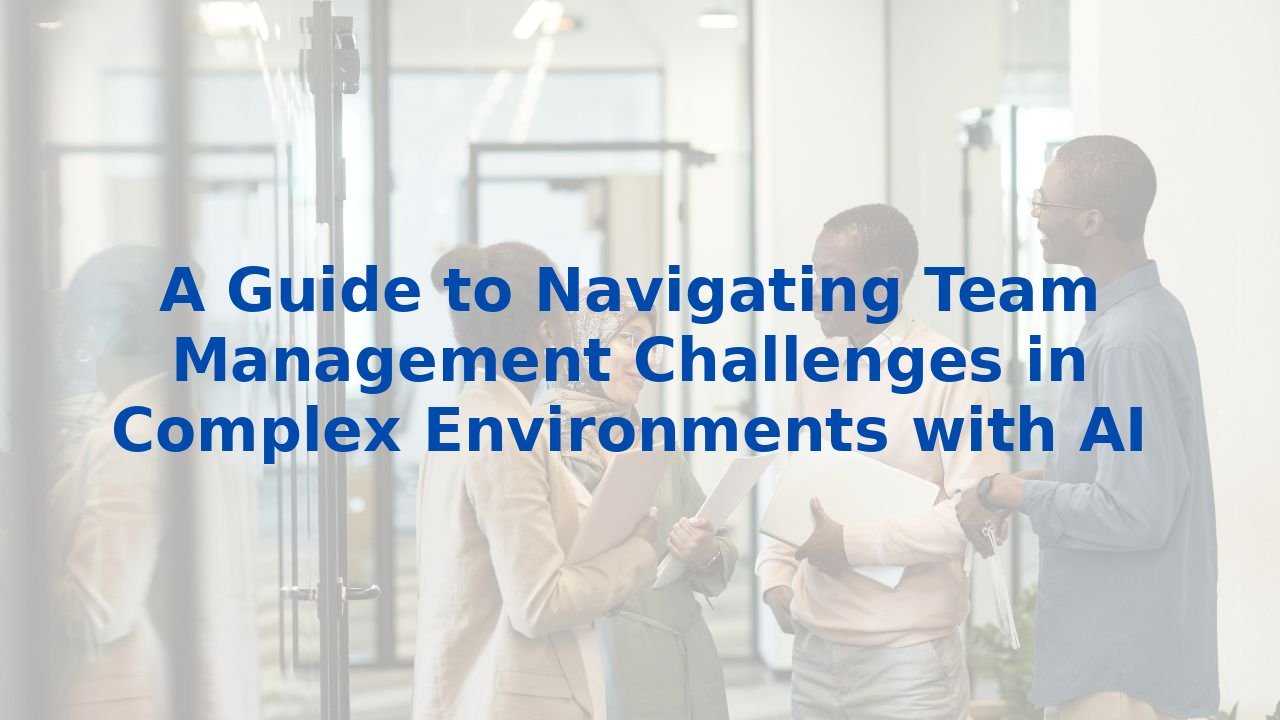A Guide to Navigating Team Management Challenges in Complex Environments with AI
A Guide to Navigating Team Management Challenges in Complex Environments with AI
The Challenge of Managing Teams in Complex Environments
In the ever-evolving landscape of business, managing teams effectively amidst complexity is not just challenging – it’s an essential skill. The rise of remote work and matrixed roles introduces a web of intricacies that traditional management approaches often fail to address. Richard Rumelt’s notion of mastering foundational skills as a precursor to tackling complex scenarios holds particularly true in people management; a solid grounding enables leaders to steer their teams more adeptly through today’s multifaceted environments.
The Role of AI in Enhancing Team Management
Enter artificial intelligence (AI), an innovative solution poised to transform team management processes by enhancing efficiency and effectiveness. Here’s how AI makes a remarkable difference.
1. Automation of Routine Tasks
Think of all the hours lost to repetitive, mundane tasks. AI swoops in to automate these routine responsibilities, liberating team members to direct their focus towards high-impact, strategic endeavors. This not only boosts engagement but also amplifies productivity across the board.
2. Enhanced Collaboration
In our interconnected world, asynchronous collaboration has become a lifeline. AI facilitates contributions from team members during their peak productive hours, catering to diverse work patterns and time zones. This flexibility fosters a healthier work-life balance, a non-negotiable element for maintaining morale and output in complex team settings.
3. Data-Driven Decision Making
AI's remarkable ability to sift through vast amounts of data uncovers insights and patterns that the human eye might miss. By turning data into actionable information, AI enriches brainstorming sessions and cultivates an atmosphere ripe for innovation. Teams can explore creative avenues that lead to uncharted solutions.
4. Clear Roles and Responsibilities
Clarity often eludes distributed teams, but AI can bridge that gap by summarizing meetings and delineating action items for each member. This structured approach mitigates confusion surrounding roles, ensuring every team member knows their responsibilities and deadlines, and it helps keep the entire team aligned and accountable.
5. Balancing Workloads
AI excels in workload analysis. By scrutinizing task completion patterns, AI identifies imbalances and recommends optimal task assignments. This ability to fine-tune workloads nurtures a more harmonious work environment, essential for sustaining motivation and productivity levels.
6. Fostering Independence and Confidence
Imagine a team where individuals feel equipped to tackle challenges independently. AI cultivates this independence by offering valuable insights and resources to team members, empowering them to own their roles and contribute meaningfully to team objectives. The result? A boosted dynamic that promotes both personal growth and collective achievement.
7. Streamlining Communication
Effective communication is the glue that holds teams together. AI-powered tools enhance this by automating messaging, setting reminders, and making intelligent suggestions on connections and channels. By alleviating communication overload, these tools ensure critical information remains at the forefront, enabling timely and informed decisions.
The Benefits of Training Employees for AI
To capitalize on these advantages, organizations must also focus on the training and development of their workforce. Here’s why empowering employees with AI knowledge is essential:
- Understanding AI Capabilities: Training provides team members with insights into AI’s functionalities, enabling them to maximize its potential for tasks like data analysis and decision-making.
- Developing Soft Skills: While AI can handle data, it cannot replicate essential soft skills such as empathy, leadership, and creativity. Training incorporates these vital elements, enhancing collaboration.
- Adapting to Change: AI technology evolves rapidly; continual training keeps employees agile, relevant, and attuned to the latest developments, granting organizations a competitive edge.
Conclusion
AI stands as a formidable ally in the quest to enhance team management within complex environments. Its ability to automate tasks, facilitate collaboration, and drive data-driven decisions places it at the heart of modern business strategy. However, the true potential of AI emerges only when leaders prioritize employee training alongside technology adoption. By fostering a workforce equipped to harness AI’s capabilities, organizations can navigate the complexities of today’s team management landscape with confidence, efficiency, and a renewed sense of possibility.
For organizations looking to invest in their teams, explore comprehensive programs available for training your entire workforce in AI skills, ensuring your team is primed for future challenges.



